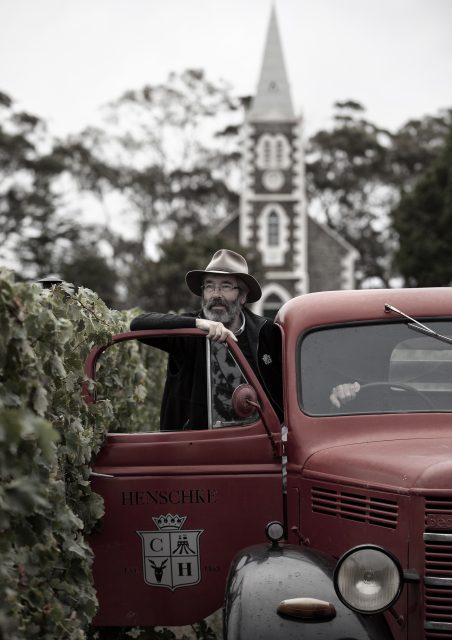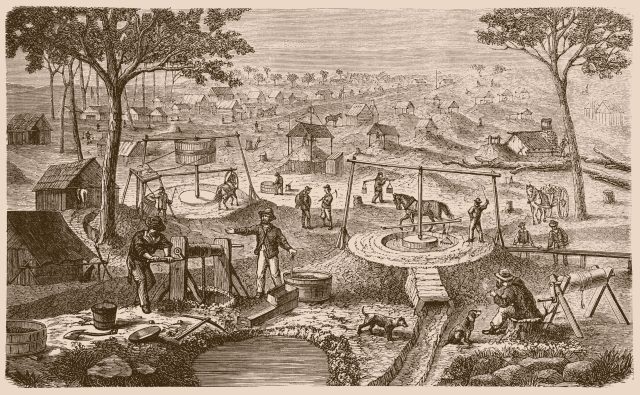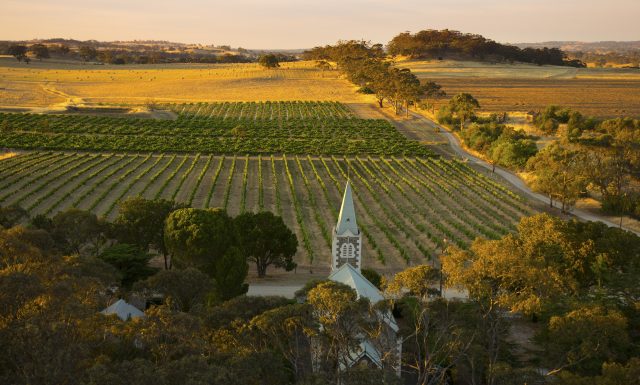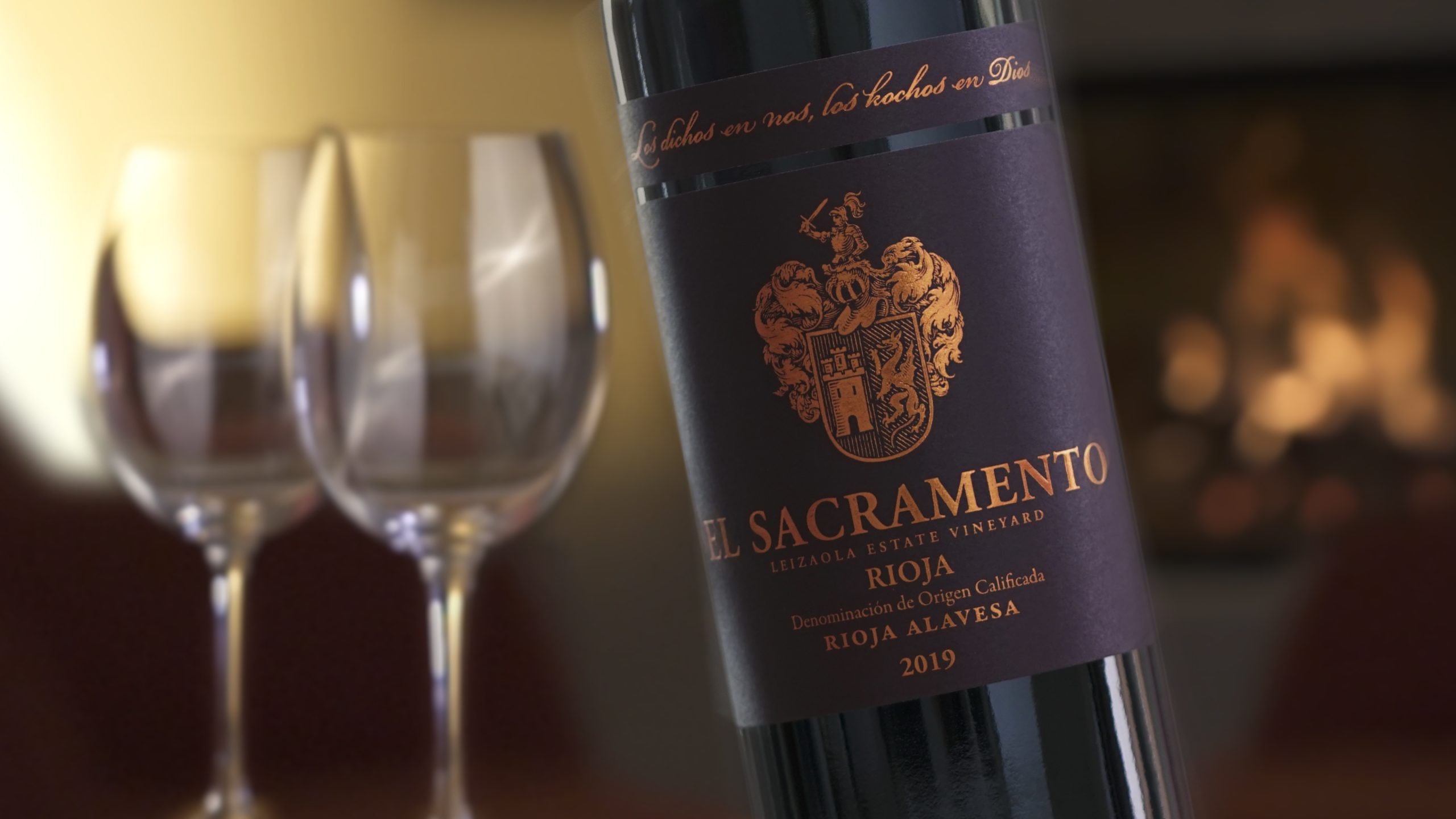The Big Interview: Stephen Henschke
By Sarah NeishSouth Australia’s Stephen Henschke talks to Sarah Neish about resilience, Riesling and being crowned winemaker of the year by his peers.

The professional wardrobe of Stephen Henschke, winemaker for one of the oldest and most celebrated producers in South Australia, might have looked quite different if he’d chosen left instead of right at one junction. While we’re used to seeing him decked out in the universal winemaker’s uniform of jeans and gilet, he came close to spending his days in a wetsuit and fins. Drawn to the call of the ocean, Stephen initially considered pursuing a career in marine science, having been inspired by the extraordinary underwater adventures of oceanographer Jacques Cousteau.
“Australia has amazing sea life, which I appreciated as a member of The University of Adelaide diving club, completing dives all around the country,” he tells db. He certainly never expected to find himself in the driver’s seat of the family winemaking business, revealing that he expected his older brother to take over the role of winemaker instead. Ever the pragmatist, however, Stephen decided to study biochemistry, microbiology and botany “just in case”.
It proved a wise insurance policy, as in 1979 he ended up picking up the winemaking mantle from his father, Cyril Henschke, following the latter’s sudden death. Stephen speaks reverently of his father’s “pioneering spirit”, but you’ll find the same quality runs through every page of the Henschke story like the spine of a well-thumbed book.

Particular snapshot
Founded in 1868, Henschke emerged during a very particular snapshot in Australian history. It was the year of the country’s biggest gold rush, when more than 7,000 fortune-seekers descended on the creeks of the South Para river near the Barossa Valley to sift for the precious metal. That same year, convict transportation to Australia also officially ended, with the good ship Hougoumont arriving in the Antipodes with the last belly-load of prisoners after setting sail from Portsmouth in the UK. When the vessel docked in Fremantle, it drew a line under 80 continuous years of penal emigration.
The Henschke family business, therefore, was birthed during an era of great change and collective excitement for the future. By the time Cyril Henschke took the company reins in 1955, Australia and its wine trade was on the cusp of an equally seismic period.
“During a time of [largely] fortified wine production in Australia, dad was able to take a visionary approach and connect with people’s growing desire to drink fine table wine with the food introduced to Southern Australia in the late 1940s by migrants from Italy, Greece and Yugoslavia after World War II,” Stephen Henschke explains.
“My father’s first single-vineyard wine, Mount Edelstone, became the hero of the Henschke portfolio, first made in 1952 from ungrafted, pre-phylloxera Shiraz vines planted in 1912. His wines were authentic, balanced, elegant and showed a strong sense of place.”
With this, Cyril lit a path for Stephen to follow, and last month Stephen’s own exceptional career was honoured when he became the recipient of the Winemakers’ Winemaker Award.
Outstanding achievement
Presented at ProWein during a joint reception held by the Institute of Masters of Wine and the drinks business, the award recognises outstanding achievement in the field of winemaking. Previous recipients include New Zealand’s Michael Brajkovich MW, northern Rhône vintner Jean-Louis Chave, Ribera del Duero’s Peter Sisseck, the Mosel’s Egon Müller and Burgundy’s Anne-Claude Leflaive, not to mention fellow Australian Peter Gago.
“I’m absolutely delighted and honoured,” Stephen tells db. “It is a proud achievement for our business, which is now celebrating more than 150 years of Henschke family winemaking.”
Stephen recalls plenty of ‘eureka!’ moments during his 45-year tenure to date, including switching from cork to screwcap for the company’s wines.
“In my early years as an Eden Valley winemaker I was frustrated by how quickly my Rieslings were developing in bottle under cork,” he says. “After continual frustration with cork, my first bottling of our Riesling under screwcap in 1996 proved its superiority beyond doubt. Trials and analysis by The Australian Wine Research Institute validated my results, and from the 2021 vintage, all Henschke wines will be bottled with Stelvin closures.”
Resilient vineyards
Out of everything the Henschke family estate has accomplished over the last nearly half-century, Stephen is most proud of “the health and resilience of our vineyards”, much of which he owes to the considerable prowess of his wife Prue. A highly regarded viticulturist, botanist and environmentalist, Prue has been instrumental in promoting biodiversity and sustainability in South Australia since the 1980s, when “mechanisation, herbicides, insecticides and synthetic fungicides dominated,” explains Stephen.
“Our progress towards regenerative viticulture was driven by my wife, who wanted our vineyards and grapes to be free of chemicals, fertilisers and excessive tillage,” he continues. Prue focused on natural sprays, composts, mulch and biodynamic preparations, including the introduction of native grasses and flowering plants that she classified, selected and propagated to create a healthy environment for vine growth.
“I believe the purity and balance of our wines have benefitted enormously from this,” says Stephen.
The self-effacing winemaker also makes a hat tip to his wife’s trials with the Scott Henry trellis (a cane-pruned system) “in a vigorous section of our Mount Edelstone Shiraz vineyard in 1989”, which he sees as another key turning-point. “The increased light exposure to the fruit produced deeper colour, greater aromatics and flavour, and better tannin maturity in the wines,” he says.

Ancient ranges
Henschke is located in the ancient Mount Lofty Ranges, formed when Australia was part of the Gondwana landmass, between 500mn and 1bn years ago. “This gives us a diverse range of climates and soils,” says Stephen, which he says allows him to take Shiraz and Riesling, the signature varieties of the region, to new quality heights. Most vintages of Henschke’s top Shiraz wine, Hill of Grace, sell for about £600 per bottle (the forthcoming 2021 release, available in May, will be priced at £675), which gives some idea of this wine’s iconic status.
With such incredible terroir as his playground, would Stephen ever be tempted to make wine anywhere else?
“I believe that my ancestors chose well when they settled in the Eden Valley,” he says. “However, I have been impressed by the Pinot Noir wines produced in the Willamette Valley, Oregon. I also love German Riesling and would enjoy making Riesling in the Rheingau or the Mosel.”
Pinot is something Stephen introduced to the business himself as that “pioneering spirit” embedded in his DNA took its course. In the early 1980s, he was among the first to plant Pinot Noir and Chardonnay in the cool-climate Lenswood sub-region of Adelaide Hills. He’s enormously proud of the two varieties’ ability to express themselves in Adelaide soils, meaning Henschke has never felt “the need to imitate others”, he says.
Standout of the decade
Despite the Winemaker’s Winemaker award recognising Stephen’s long scroll of past successes, his eyes remain on the horizon, with Henschke’s 2021 single- vineyard wines due for release in May. He describes 2021 as an “exceptional vintage, thanks to one of the coolest summers South Australia had experienced in 19 years. These cooler temperatures resulted in a wonderful balance of ripeness, maturity of fruit flavours and tannins, and perfect pH and acid balance”. Or, in more consumer- friendly terms, “wines of remarkable complexity, elegance and depth of flavour.
While the 2021s are drinking beautifully now, Henschke says they are showing “impressive potential for long-term ageing over 30-plus years, under ideal cellaring conditions”. The 2021 vintage, he stresses, “will be a standout of the decade”.
For a family winery to have flourished for as long as Henschke, it requires commercial nous as well as winemaking talent. How does the business ensure that it remains profitable? “The Henschke philosophy is to be better, rather than bigger,” Stephen explains. “With limited resources – such as old, ungrafted vines, lack of water and restricted power availability, we focus on our strengths by making limited-production, quality wines from single-site vineyards, while maintaining a deep commitment to regenerative viticulture to protect our ancient soils.”
Fortunately, he concludes: “We have the freedom to create wine styles that we love, but that also have historical significance to both our family and our customers.”
One arguably couldn’t do that in a wetsuit…
Related news
The Big Interview: David Parker




